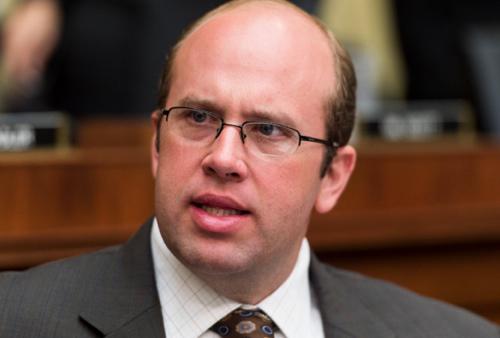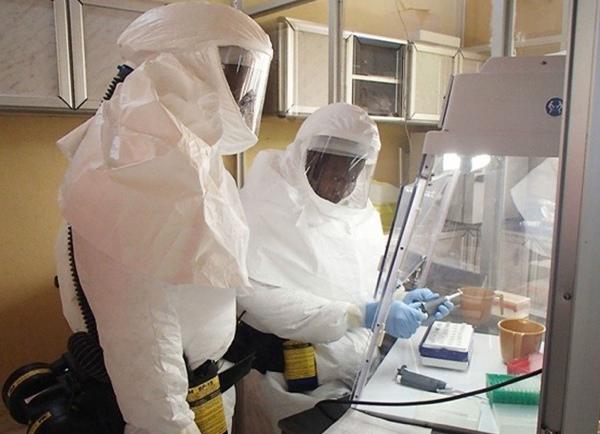
Poplar Bluff, Missouri - Jason Smith released the following statement on Tuesday night's election results:
“As a seventh-generation Missourian, I am truly humbled that the voters of southeast Missouri have re-elected me to represent them in Congress.
“Since the voters first elected me as their congressman 17 months ago, I have battled to get government out of the way so southeast and southern Missouri can thrive.
“As a farmer and small business owner, I've seen firsthand how government intrusion stifles economic growth. That's why I introduced legislation called the SCRUB Act to clear out the thousands of pages of regulations that hurt our businesses and farms and keep good jobs from being created. I have fought to keep unconstitutional government overreach from compromising our personal privacies. And when the National Park Service unfairly singled out baptisms on the Current River for extra permits, I held the administration accountable and got the decision reversed.
“But there is still more work to be done.
“It's my promise that I will continue fighting to bring good jobs to southeast and southern Missouri, protect our way of life, and stand up for rural Missourians.
"Our priorities must be a balanced budget, reducing ineffective and intrusive regulations, and protecting our freedoms, because if Washington was more like Missouri, we'd be a lot better off.
"I am honored by the great responsibility the voters have placed in me. It has been, and will continue to be, a privilege to serve the people of Missouri's 8th congressional district every day.”
Jason Smith won overwhelmingly, carrying all 30 counties in Missouri’s 8th district.

We have heard a lot about partisan gridlock lately, but the truth is that over the past two years the House of Representatives passed hundreds of bills that would improve the lives of Americans. We’ve passed bills to put Americans to work, get energy costs down, and ease burdens on businesses. But where are those bills now? They’re stuck in the Senate.
The 387 bills stuck in the Senate are the solutions America needs to prosper and the solutions Americans have been demanding.
Take the American Energy Solutions for Lower Costs and More American Jobs Act. It would help the Keystone XL pipeline move forward by removing the Presidential Permit process and would keep the EPA from implementing even more regulations which could cost more than $1 billion.
The Jobs for America Act would repeal the Obamacare designation of 30 hours per week as full-time employment, and repeal the medical device tax. It would give companies the certainty they need to plan, hire, and expand by making critical tax credits permanent for research and development and small businesses.
In addition to jobs bills, and energy bills, and tax credits, there are bills to protect our way of life. The Farmers Undertake Environmental Land Stewardship (FUELS) Act would protect farmers from unfair EPA regulations, and the Equitable Access to Care and Health (EACH) Act would add additional protections for religious freedoms from the Obamacare mandate.
Families would keep more of their hard-earned money with the Child Tax Credit Improvement Act of 2014, which would raise the income cap for the credit and make more families eligible.
The House of Representatives has been hard at work pursuing real solutions to the problems facing America while the Senate has been sitting on its hands. Since the start of 2014, the Senate has had only 88 votes on passing or advancing legislation, or just about two legislative votes a week. During the same time period, the House has taken 515 roll call votes to pass or advance legislation and help the American people. That averages to about 12 legislative votes a week. Today, there are 387 House bills stuck in the Senate that won’t even be considered, and 95 percent of them passed with bipartisan support.
The House of Representatives has passed the solutions to bring good paying jobs, energy independence, and long overdue regulatory reform. Now it’s time for the Senate to act so we can move forward.

“We stand ready to respond to suspected cases of Ebola should one ever occur in Missouri. This designation will give us the ability to quickly assist health professionals by performing the presumptive test here in Missouri,” Gov. Nixon said. “Missouri’s public health workers, health care providers and first responders have been training and preparing for potential Ebola cases and this will strengthen their ability to protect the health and well-being of Missourians.”
“Assisting with the testing of specimens is part of the important work we do with federal and local public health partners to identify diseases and protect the public health,” said Missouri Department of Health and Senior Services Director Gail Vasterling. “Receiving this designation means we can help test and respond to any suspected Ebola cases in a timely and accurate manner.”
Earlier this month, the Governor directed DHSS to seek the designation in order to enhance the state’s ability to quickly confirm or rule out potential cases of Ebola, should such a case occur in Missouri. Because of the designation as an Ebola testing laboratory, the Missouri State Public Health Laboratory may receive laboratory specimens as a part of the coordinated CDC and public health investigation and control of the disease. All specimens must have prior approval before being submitted to the Missouri State Public Health Laboratory.
“This is a positive step, because when it comes to detecting infectious diseases, hours – and even minutes – can be crucial,” said Gov. Nixon. “The faster we can confirm – or rule out – a potential case of Ebola here in Missouri, the more effectively our health providers can respond to protect the public.”
The Missouri State Public Health Laboratory has been a designated CDC Laboratory Response Network (LRN) laboratory since the inception of the national program in 1999. The LRN is an integrated network of state and local public health, federal, military, and international laboratories that can respond to bioterrorism, chemical terrorism and other public health emergencies through training, rapid testing, timely notification and secure messaging of laboratory results.
Additionally, the Governor today made available $3.3 million in funding for local public health agencies.
“Throughout the year, and especially now during flu season, our local public health agencies provide essential services that keep their communities healthy and strong,” Gov. Nixon said. “That is why my administration is releasing 3.3 million dollars to help local public health agencies carry out their responsibilities at the local level. Revenue is limited, but with more than 8,000 jobs added last month, it’s clear that our economy is moving forward and I’m pleased we’re able to make these resources available.”
Those who would like more information about the Missouri State Public Health Laboratory should visit: http://health.mo.gov/lab/index.php
Gov. Jay Nixon will visit the Missouri State Public Health Laboratory today (Oct 17) to discuss the state’s efforts to prepare for public health emergencies, including the Ebola virus, should a case of the disease occur in Missouri.
TODAY, Oct. 17
WHO: Gov. Jay Nixon
WHAT: Update on public health preparedness efforts
WHEN: 10:30 a.m.
WHERE: Missouri State Public Health Laboratory
101 N. Chestnut St.
Jefferson City, Mo. 65101

MSTA Legislative IMPACT Committee Endorses Tila!
Stoddard County, Missouri – Tila Rowland Hubrecht has been endorsed by the Missouri State Teachers Legislative IMPACT Committee.
Education is important to all of us. Our children are our most valuable assets. I will work hard to ensure that our children’s education is protected; teachers are supported and local control of our schools return. I am proud to be endorsed by the MSTA Legislative IMPACT Committee. I am the mom of two girls and I am a former teacher. I understand the importance of our children’s education.

When I talk to individuals throughout the district, many have heard about the Environmental Protection Agency’s attempt to use 40-plus-year-old laws to close coal power plants, regulate puddles of water and restrict how children can help on family farms. This week, I am focusing on how another 40-year-old law, the Endangered Species Act, is increasingly used to erode private property rights, restrict how farmers use their land and water, and could destroy Missouri’s timber industry.
Most everyone agrees there is value in preventing species from extinction. The problem with the Endangered Species Act is that it does not fulfill its mission of recovering species. Since the law was enacted, more than 1,500 U.S. domestic species and sub-species have been listed as endangered; however, only two percent have been recovered. In practice, an Endangered Species listing often leads to permanent, private property land-use restrictions that negatively impact local economies and result in expensive, never-ending litigation.
One example of the damage that an endangered listing can cause is the story of the Northern Spotted Owl and the timber industry in the Pacific Northwest. In 1990, the Northern Spotted Owl was listed as “endangered”. Since that time, more than 80 percent of the Northwest’s timber industry has shut down, more than 9 million acres of forest have been identified as “off-limits,” and the forests have become such a fire hazard that wildfires have burned hundreds of thousands of acres of valuable timber and spotted owl habitat. Ironically, the Northern Spotted Owl population continues to decline with no signs of recovery due to a larger, predatory owl species.
Why does this matter to Missouri? Currently, the Fish and Wildlife Service is considering whether or not to list the Northern Long Eared Bat as “endangered” throughout our state, as well as 37 other states. Many agree that a disease called “White Nose Syndrome” is killing the bats; however, there is no credible research that shows harvesting timber, farming, or other development has anything to do with this disease.
The Fish and Wildlife Service should not make the same mistake twice. The Endangered Species Act is an old, unwieldy instrument that has become a litigation magnet, restricting human activities. It has not proved to help restore species in decline. In the case of the bat, it could take a bad situation and make it worse. Missouri’s timber industry is thriving, employing more than 67,000 people and contributing more than $8 billion to our economy. Reducing the timber industry by 80 percent would mean losing 53,600 jobs and removing $6.4 billion dollars from Missouri’s economy, with no assurance that the bat population will improve.
Albert Einstein defined insanity as doing the same thing over and over and expecting different results. Missouri’s timber industry is too valuable to allow Federal Bureaucrats to shut it down as they did in the Northwest. I oppose the listing of the Northern Long-Eared bat as endangered in Missouri, and I would encourage others to do so as well.
Sincerely,
Jason Smith

